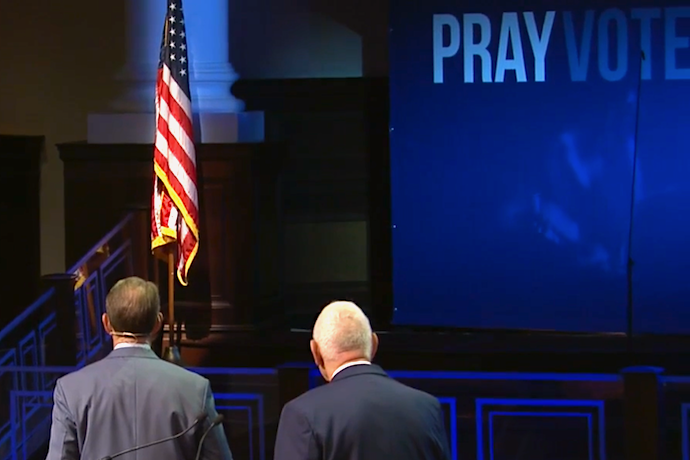The following kicks off RD and PRA’s special coverage of the Pray Vote Stand Summit. All subsequent posts can be found here. – eds
9/14/2022 Evening
The Family Research Council’s Pray Vote Stand Summit starts with a flourish as a full orchestra and choir welcomes attendees to the nation’s most influential Christian Right political conference once known as the Values Voter Summit. After a rousing welcome from Family Research Council president Tony Perkins, who mentions the anti-abortion Supreme Court Dobbs decision in his first sentence, the conference dives directly into the first panel: Abortion: Answering the Hard Questions. And what are those hard questions? Well, there’s one major question: should there be exemptions from total bans on abortion? The answer is a predictable one: No. No exceptions.
Melissa Ohden is the founder of the Abortion Survivors Network and calls herself “an abortion survivor.” Exceptions to abortion bans, even in the case of a pregnant person’s rape or abuse wouldn’t just harm the unborn fetus, according to Ohden, who is also a victim of sex trafficking. Exceptions to abortion would “fuel trafficking and abuse,” according to Ohden and Perkins.
Permitting abortion in the case of human trafficking or abuse by a family member or intimate partner would allow those traffickers and abusers to coerce pregnant people into abortions—traumatizing a woman even more. On the contrary, a baby would more likely save a woman from a trafficking or abusive situation. Confused? We are too. If you can follow this logic, please let us know!
Coerced abortions are abuse. And abuse is criminalized in the United States, including coerced abortion. The solution to ending coerced abortion cannot be the total banning of abortion care. Data shows that it is in fact coerced pregnancy that traps pregnant people and their children in cycles of poverty and abuse. It is coerced pregnancy that keeps pregnant people from accessing educational and professional opportunities.
After the Hard Questions have been answered thusly, Katy Faust, founder of Them Before Us, an anti-LGBT, anti-trans, anti-abortion children’s advocacy organization, takes the stage. Faust claims that children haven’t changed since 1996 when the Defense of Marriage Act was passed, prohibiting federal recognition of marriages outside of one man and one woman. She asks if children haven’t changed, why has marriage?
It is time, Faust urges the crowd, to bring back that definition of marriage. “Marriage is a matter of justice,” says Faust. Children have a right to know the people who conceived them, according to Faust. Without that knowledge, Faust says, children suffer. They long for their mother or long for their father. Children without that knowledge will never be whole.
Faust’s message directly contradicts the message of Ryan Bomberger, founder of the pro-adoption Radiance Foundation, who spoke alongside Melissa Ohden in the previous panel on abortion. Bomberger, who describes himself as “conceived in rape and adopted in love” delivers a message of hope: if each evangelical family would adopt one child, all of the children in US foster homes would have found a loving home. Perkins agrees: “we need to focus on adoption!”
Not to lean too firmly on the hypocrisy, but the disconnect between Bomberger’s and Faust’s messages is salient. Which is it: Do all children need a connection to the people who contributed their genetic material regardless of their fitness to parent? Or do all children need a loving home? In their minds adoption is the less ideal option, but one that must be employed to save children from disconnection from the father and mother figures they desperately need.
Speaker after speaker hammers home the Christian Right’s tired talking points: abortion is violent, marriage is holy, trans people and nonbinary people are harming children, and communism is infecting our government.
And Dr. Albert Mohler, president of The Southern Baptist Theological Seminary, brings it home. “We need the right voters with the right issues” coming to the polls this election and in 2024. After 2020 Republican losses in Georgia, it’s telling that the Family Research Council brought the conference to Atlanta. Mohler reminds the audience that, come November’s midterm elections, the whole country “will be looking at Georgia.” Georgia’s Senate hopefuls Herschel Walker and Raphael Warnock were both invited to speak at Pray Vote Stand on Friday. Neither is confirmed, but we will let you know.
Dr. Mohler and Allie Beth Stuckley, host of BlazeTV’s Relatable, a conservative newscast, confirms that we are in a war—a culture war—to maintain and preserve traditional families. Mohler compares today’s situation to WWII, where those who were “embarrassed” weren’t the Churchills who predicted war, but those who called the Churchills “extremists” for acknowledging impending battle.
Stuckey, bringing it back to children, calls them “the unconsenting subjects of progressive social experiments.” From COVID policy that robbed children of an education for two years or genital mutilation through gender-affirming surgery, liberal policies stand in contrast to the Church which, from its inception, has protected children (colonialism, sexual abuse, etc. aside). The Church cares, loves and protects the “most vulnerable,” particularly unconsenting children, fetuses, and zygotes.
Pastor Gary Hamrick, Senior Pastor at Cornerstone Chapel in Loudon, Virginia, repeats much of what previous speakers said, but also fills in some gaps, particularly on how public schools are pushing a social agenda marred by Critical Race Theory and LGBTQ ideology. Hamrick speaks with a religious fervor as yet absent on the stage. “If they can mandate a mask, they can mandate a mark,” he preaches, likening the bare-bones COVID precautions set in place by some municipalities to the mark of the beast that signals the Revelation.
Hamrick tells the audience that he isn’t advocating for a theocracy, that he isn’t a Dominionist. Rather, he wants a government of Christians led by Christ. While fine, this distinction is important: Hamrick is claiming that he wants a theonomy—a government in which religious law binds, compared to a theocracy—a government in which religious figures make the laws. Furthermore, any candidate who claims to be a believer but supports abortion or same-sex marriage isn’t working in service of God; in other words, there’s only one way to be a real Christian.
Reach out to us on Twitter or Instagram @PRAEyesRight with any questions or comments about the summit. Read more here.





